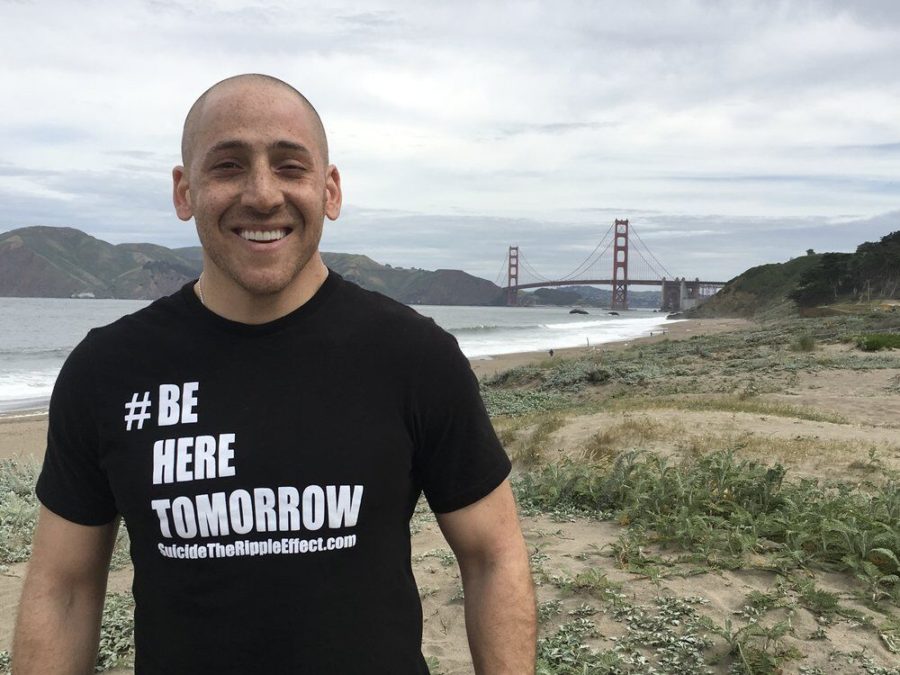Story County Mental Health Expo: “Be here tomorrow.”
Kevin Hines, who survived a jump from the Golden Gate Bridge, is now a speaker who advocates for mental health.
September 21, 2021
Content Warning: This article contains mentions of suicide.
“Are you okay? Is something wrong? Or can I help you? Were quite literally the only words I desperately needed to hear the day I found myself standing on top of the Golden Gate Bridge walkway,” Kevin Hines said.
Tuesday’s Mental Health Expo featured keynote speaker Kevin Hines and his presentation, “Be Here Tommorow: The Ripple Effect of Suicide.”
Hines followed his introduction by telling the backstory of this moment and the story of his struggle throughout childhood.
Hines was adopted by his family after being in the foster care system. Although Hines was in a healthy home, he still suffered from the effects of being neglected by his biological family.
“My gut to brain health was very, very poor,” Hines said. “I had been fed all that processed food as an infant, and it damaged my brain’s functionality. Your gut is your second brain, if your gut health is poor your brain health is poor, and vice versa, this was causing me to have mental health issues.”
Hines went into detail on how his life slowly began to improve after being adopted by the Hines family.
“Pat and Debby Hines could’ve had natural-born children, but they opted to take in three kids from three separate houses into one household and make a melting pot of a family,” Hines said.
Hines discussed how life was still not perfect, but it wasn’t until he was performing in a high school play that he had his first breaking point.
“My mental capacity was weighing, but nobody knew the depths of my insanity,” he said.
“Never silence your pain. Why? Because your pain is valid,” Hines said. “Your pain is worthy of my time and others, and your pain matters because all of you do.”
Hines then discussed the rough journey he went on to receive help for his mental health, which included a therapist on methamphetamines.
“In September of 2000, I couldn’t withstand the weight of the depression any longer,” Hines said. “I’d begun to believe I would never break free from my mental illness. I would never get better, the furthest thing from the truth but I truly believed that was my new reality.”
This struggle led him to experience suicidal thoughts.
“Suicidal ideations are the single greatest liars we know,” Hines said. “They tell us what they want us to hear out of pain. What we don’t recognize is that we can overcome that pain,”
Hines retold the entire day of his suicide attempt, and he also shared a belief he had that he claims is a common denominator for many individuals contemplating suicide.
“I had made a pact with myself that if one person says are you okay, is something wrong or can I help you, I would have stopped everything and told them every bit about my story and begged them to save my life,” Hines said. “That was my out and this is actually very common and almost instinctual for suicidal people.”
He remembers seeing many people, including officers, that neglected to notice him crying on the bridge. Hines said that police officers on the Golden Gate Bridge are now better trained to watch for the signs they failed to notice with him.
“Every year they save between 50 and 120 lives,” Hines said. “It’s amazing. It’s purely amazing, fantastic, but they didn’t know to look for me back then.”
Although he was convinced at the time that no one cared about him, he now knows that is not the case.
“I believe some of you, had you known where I was [and] what I was doing, you would have been there because you care,” Hines said. “My brain was trying to kill me as I desperately tried to cling to life.”
After his attempt, he instantly felt regret.
“If we can recognize through self-awareness techniques in a suicidal crisis that our thoughts don’t have to own, rule or define what we do next,” Hines said.
Hines was saved by a Coast Guard boat, and observers say a sea lion kept him afloat until the boat arrived.
“I get to be here, and getting to be here is a privilege and a gift no matter the pain you might be in,” Hines said. “It wasn’t until I recognized that I can fight the pain, battle the pain, live with the pain and thrive despite the pain, that I became the hero of my own story.”
Hines continued to express his appreciation for being able to share his story today and closed with a quote he now lives by.
“Yesterday is history. Tomorrow is a mystery. Today is a gift- that is why we call it the present,” Hines said.
A recorded version of this event will be available on the Mental Health Expo website until Oct. 4.







